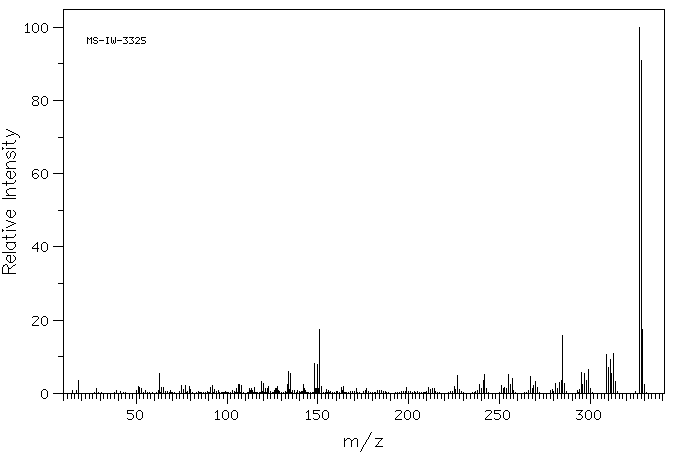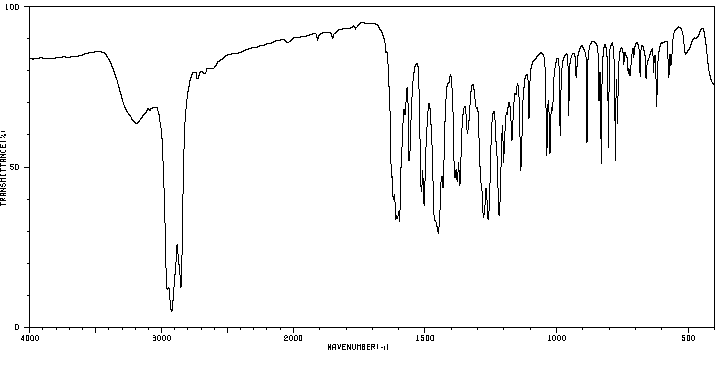2-(3-羟基-4-甲氧基苯基)-3,7-二甲氧基-4H-苯并吡喃-4-酮 | 93876-56-3
中文名称
2-(3-羟基-4-甲氧基苯基)-3,7-二甲氧基-4H-苯并吡喃-4-酮
中文别名
——
英文名称
2-(3-hydroxy-4-methoxyphenyl)-3,7-dimethoxy-4H-chromen-4-one
英文别名
2-(3-hydroxy-4-methoxyphenyl)-3,7-dimethoxychromen-4-one
CAS
93876-56-3
化学式
C18H16O6
mdl
——
分子量
328.321
InChiKey
FDUFENASKFWNKM-UHFFFAOYSA-N
BEILSTEIN
——
EINECS
——
-
物化性质
-
计算性质
-
ADMET
-
安全信息
-
SDS
-
制备方法与用途
-
上下游信息
-
文献信息
-
表征谱图
-
同类化合物
-
相关功能分类
-
相关结构分类
计算性质
-
辛醇/水分配系数(LogP):2.9
-
重原子数:24
-
可旋转键数:4
-
环数:3.0
-
sp3杂化的碳原子比例:0.17
-
拓扑面积:74.2
-
氢给体数:1
-
氢受体数:6
安全信息
-
海关编码:2914509090
上下游信息
-
上游原料
中文名称 英文名称 CAS号 化学式 分子量 2-[3-(苄氧基)-4-甲氧基苯基]-3,7-二甲氧基-4H-苯并吡喃-4-酮 3'-benzyloxy-3,7,4'-trimethoxyflavone 97257-15-3 C25H22O6 418.446 —— 3'-Benzyloxy-4',7-dimethoxy-flavonol 58544-88-0 C24H20O6 404.419
反应信息
-
作为产物:描述:3-benzyloxy-4,4'-dimethoxy-2'-hydroxychalcone 在 palladium 10% on activated carbon 、 氢气 、 双氧水 、 potassium carbonate 、 potassium hydroxide 作用下, 以 四氢呋喃 、 甲醇 、 丙酮 为溶剂, 反应 1.0h, 生成 2-(3-羟基-4-甲氧基苯基)-3,7-二甲氧基-4H-苯并吡喃-4-酮参考文献:名称:3′-Hydroxy-3,4′-dimethoxyflavone blocks tubulin polymerization and is a potent apoptotic inducer in human SK-MEL-1 melanoma cells摘要:Flavonoids are naturally occurring polyphenolic compounds and are among the most promising anticancer agents. A series of flavonols and their 3-methyl ether derivatives were synthesized and assessed for cytotoxicity. It was found that 3'-hydroxy-3,4'-dimethoxyflavone (flavonoid 7a) displayed strong cytotoxicity against human SK-MEL-1 melanoma cells and blocked tubulin polymerization, but had no significant cytotoxic effects against quiescent or proliferating human peripheral blood mononuclear cells. Our analyses showed that flavonoid 7a induces G2-M cell cycle arrest and apoptosis in melanoma cells which is associated with cytochrome c release and activation of both extrinsic and intrinsic apoptotic pathways of cell death. (C) 2017 Elsevier Ltd. All rights reserved.DOI:10.1016/j.bmc.2017.09.043
表征谱图
-
氢谱1HNMR
-
质谱MS
-
碳谱13CNMR
-
红外IR
-
拉曼Raman
-
峰位数据
-
峰位匹配
-
表征信息
同类化合物
([2-(萘-2-基)-4-氧代-4H-色烯-8-基]乙酸)
龙血树脂红血树脂
鼠李素
鼠李柠檬素3-O-beta-D-鼠李三糖苷
鼠李柠檬素
鼠李亭3-O-beta-吡喃葡萄糖苷
黄酮醇-2-磺酸钠盐
黄酮胺
黄酮榕碱
黄酮地洛
黄酮哌酯
黄酮
黄诺马甙
黄苏木素
黄花夹竹桃黄酮
黄芪总皂甙
黄芩黄酮II
黄芩黄酮I
黄芩黄酮
黄芩苷甲酯
黄芩苷
黄芩素磷酸酯
黄芩素一水合物
黄芩素-7-甲醚
黄芩素 6-O-beta-D-吡喃葡萄糖苷
黄芩素
黄烷酮腙
黄烷酮-d5
黄烷酮
黄杞苷
黄宝石羽扇豆素
麗春花青苷
鳞叶甘草素B
高车前苷
高车前素-4'-O-Β-D-葡萄糖苷
高车前素
高良姜素-5-甲基醚
高良姜素-3-甲基醚
高良姜素
高圣草酚-7-O-(6''-O-乙酰基)吡喃葡萄糖苷
高圣草酚
高圣草素-7-O-Β-D-葡萄糖苷
高圣草素
骨碎补素
马里甙
马醉木素
马缨丹黄酮苷
马来酸2-乙酰基-10-[2-(二甲基氨)丙基]-10H-苯并噻嗪正离子
香风草甙
香蒲新苷








